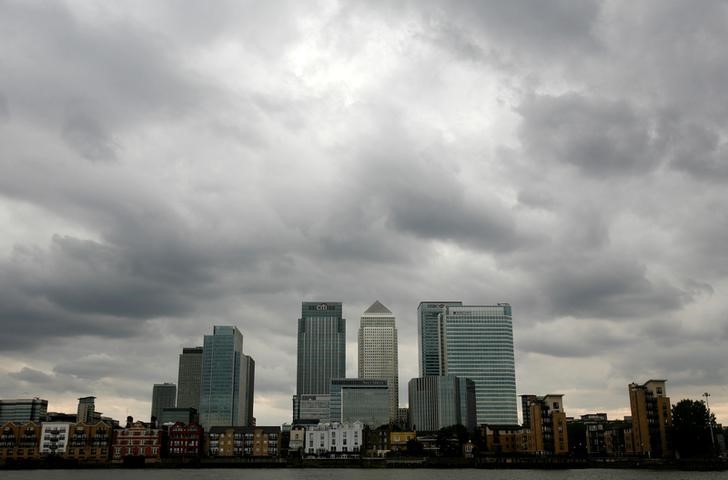As March 2019 exit date approaches, companies remain in the dark

LONDON (Reuters) — After the maelstrom of Prime Minister Theresa May's election crisis and a struggle in government over the shape of Brexit, business chiefs have a simple request for Britain: Give clarity on how the EU divorce might look.
Since May nearly lost her job in a botched June 8 election gamble, ministers have sought to strike a more inclusive tone, even inviting in some chief executives to a 17th century manor house to discuss Brexit over a buffet lunch.
But as the March 2019 exit date approaches, six major British business chiefs told Reuters they still do not have the answers about post-Brexit immigration, trade and regulation they need to plan and make coherent investment decisions.
"I see through a glass darkly. It's hard to discern exactly what is happening at the moment," Rupert Soames, CEO of British outsourcing group Serco, said.
Serco was finding it harder to attract truck drivers in its waste collection business in Britain because of a lack of clarity about Brexit, he said. Many were opting instead to work in Spain, Italy or Portugal.
"There has been a bit of a thaw in Number 10, but nothing dramatic," said a FTSE 100 company senior executive who asked not to be named due to the sensitivity of Brexit.
"Before the election, they weren't listening. Now, they're trying to listen, but they have very little of substance to say on the topic that matters far more than any other," the executive said.
Some business chiefs also said they were disorientated by a public battle at the heart of government over the shape of the divorce, including crucial details such as immigration controls and the length of any possible Brexit transition.
While the stakes are high, time is short.
Britain has less than two years to negotiate the terms of the divorce and the outlines of the future relationship before it is due to leave in late March 2019, though a transition could give businesses more time to adjust to the new relationship.
Still, many business chiefs worry that there is ample room for a breakdown in talks and a disorderly Brexit that would imperil Britain's $2.5 trillion economy by sowing chaos through the labor market and trade flows.
The EU and Britain need to reach agreement on everything from expatriate rights to the complexities of customs to keep trade flowing between the world's biggest trading bloc and the fifth largest global economy.
BREXIT TRANSITION?
FTSE-100 executives said they understood ministers could not give an exact outline while negotiations were under way. But businesses did need to understand the rights of EU workersand how trade would work the day after March 29, 2019.
May wants to negotiate the divorce and the future trading relationship with the EU before Britain leaves, followed by what she calls a phased implementation process to give business time to prepare for the impact of the divorce.
Britain's pharmaceutical industry needs at least two years' transition to cope with the impact of Brexit, said Emma Walmsley, the chief executive of GlaxoSmithKline.
"Our main focus is to make sure that we are given a sufficiently long transition period, that is really the thing that matters in our sector," she told reporters. "The absolute minimum for us - minimum - is two years."
May has given little detail on the transition she wants but her finance minister, Philip Hammond, has said there should be no immediate change to immigration or trading rules when Britain leaves, and that a transition could last until mid-2022.
But Hammond's vision is opposed by other senior ministers within May's government who want a cleaner break with the club Britain joined in 1973.
CLIFF EDGE?
Britain should turn up the pragmatism and tone down the ideology in its Brexit negotiations, Dixons Carphone Chief Executive Seb James told Reuters.
James, whose company employs around 4,000 citizens from other EU countries out of a total UK workforce of about 26,000, said May's government should give more clarity about the transition period.
"It's not fair on people to not give them some kind of clarity as quickly as possible," James said in an interview at Dixons Carphone's Acton headquarters in west London. "We need to get that sorted, and we need to get it sorted now."
Britain will in coming days set out its negotiating position on a range of Brexit issues. A government source said ministers were engaging with business to ensure that Brexit was a success.
Companies seeking clarity are likely to be disappointed until a departure deal is done, G4S Chief Executive Ashley Almanza said.
"(Everyone) is waiting for clarity on how Brexit is going to affect the outlook and I think basically that we're going to know when we get there," said the head of the world's largest security group.
In the absence of clarity from the government, some company bosses said they are planning for the worst - what they call a "cliff edge" Brexit.
"A lot of our businesses are starting to take a more pessimistic view," said one senior executive who spoke on condition of anonymity. "We're pressing all of the time to get clarity but we remain concerned that there's no clarity."




